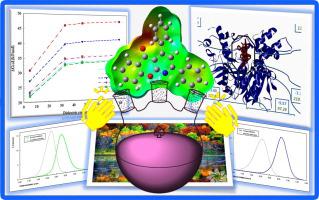当前位置:
X-MOL 学术
›
J. Mol. Liq.
›
论文详情
Our official English website, www.x-mol.net, welcomes your
feedback! (Note: you will need to create a separate account there.)
Efficient synthesis of chromeno[2,3-b]pyridine derivatives using Zn(OTf)2 as a catalyst: DFT computations, molecular docking and ADME studies
Journal of Molecular Liquids ( IF 5.3 ) Pub Date : 2023-02-01 , DOI: 10.1016/j.molliq.2023.121364 Goncagül Serdaroğlu , Nesimi Uludag , Elvan Üstün
Journal of Molecular Liquids ( IF 5.3 ) Pub Date : 2023-02-01 , DOI: 10.1016/j.molliq.2023.121364 Goncagül Serdaroğlu , Nesimi Uludag , Elvan Üstün

|
An efficient method was developed for the synthesis of chromeno[2,3-b ]pyridine derivatives by using Zn(OTf)2 (Zinc trifluoromethanesulfonate) via one-pot [3 + 3] cascade annulation methods using 2-amino-4H -chromen-4-one with a different substituted group (1 –6 ) and trans- chalcone. This strategy offers the pharmacological importance of 2-amino-4H-chromen-4-one derivatives in reaction time and good yields. This approach also brings a different perspective to the literature as an intramolecular cyclization pathway. All computational works were performed at the B3LYP/6–311++G** level of theory. After confirming the optimized structures and comparing the calculated spectroscopic data with corresponding experimental data, the intramolecular interactions were evaluated on the basis of NBO “Natural Bond Orbital” theory. The quantum chemical reactivity features and FMO “Frontier Molecular Orbital” analyses were conducted at the same level of theory. The solvent effect on the reactivity behaviors was also investigated by using the results that were determined by obtaining the different solvent environments. Molecular docking was employed to explore the binding affinities of the compounds against AChE (Acetylcholinesterase), BuChE (Butyrylcholinesterase), and HSA (Human serum albümin). Also, the bioavailability and drug-likeness properties of compounds 1 –6 were determined to explore the possible usage in further drug design works.
中文翻译:

以 Zn(OTf)2 为催化剂高效合成铬基[2,3-b] 吡啶衍生物:DFT 计算、分子对接和 ADME 研究
通过使用 2-氨基-4H-铬-4-酮和具有不同取代基 (1-6) 和反式查尔酮,通过一锅法 [3 + 3] 级联环化方法,使用 Zn(OTf)2(三氟甲磺酸锌)开发了一种合成铬代[2,3-b]吡啶衍生物的有效方法。该策略在反应时间和良好产率方面提供了 2-氨基-4H-铬-4-酮衍生物的药理学重要性。这种方法也为文献带来了不同的视角作为分子内环化途径所有计算工作均在 B3LYP/6–311++G** 理论水平上进行。在确认优化结构并将计算的光谱数据与相应的实验数据进行比较后,根据 NBO“自然键轨道”理论评估分子内相互作用。量子化学反应性特征和 FMO“前沿分子轨道”分析在同一理论水平上进行。此外,还通过使用通过获得不同溶剂环境确定的结果来研究溶剂对反应性行为的影响。采用分子对接来探索化合物对 AChE (乙酰胆碱酯酶) 、 BuChE (丁酰胆碱酯酶) 和 HSA (人血清 albümin )的结合亲和力。此外,还确定了化合物 1-6 的生物利用度和药物相似性,以探索在进一步的药物设计工作中的可能用途。
更新日期:2023-02-01
中文翻译:

以 Zn(OTf)2 为催化剂高效合成铬基[2,3-b] 吡啶衍生物:DFT 计算、分子对接和 ADME 研究
通过使用 2-氨基-4H-铬-4-酮和具有不同取代基 (1-6) 和反式查尔酮,通过一锅法 [3 + 3] 级联环化方法,使用 Zn(OTf)2(三氟甲磺酸锌)开发了一种合成铬代[2,3-b]吡啶衍生物的有效方法。该策略在反应时间和良好产率方面提供了 2-氨基-4H-铬-4-酮衍生物的药理学重要性。这种方法也为文献带来了不同的视角作为分子内环化途径所有计算工作均在 B3LYP/6–311++G** 理论水平上进行。在确认优化结构并将计算的光谱数据与相应的实验数据进行比较后,根据 NBO“自然键轨道”理论评估分子内相互作用。量子化学反应性特征和 FMO“前沿分子轨道”分析在同一理论水平上进行。此外,还通过使用通过获得不同溶剂环境确定的结果来研究溶剂对反应性行为的影响。采用分子对接来探索化合物对 AChE (乙酰胆碱酯酶) 、 BuChE (丁酰胆碱酯酶) 和 HSA (人血清 albümin )的结合亲和力。此外,还确定了化合物 1-6 的生物利用度和药物相似性,以探索在进一步的药物设计工作中的可能用途。































 京公网安备 11010802027423号
京公网安备 11010802027423号